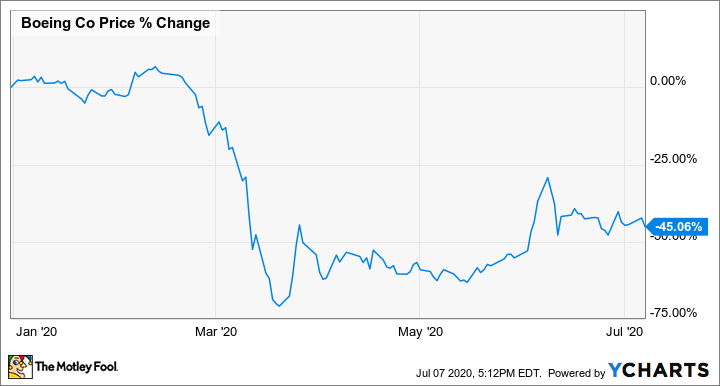Boeing (BA -0.24%) was dealt a fresh blow on Tuesday when aircraft leasing specialist Avolon said it had canceled orders for 27 737 Max jets.
The jets represent a small fraction of Boeing's 4,000-jet order book, but for Boeing investors, the risk is a death by one million cuts. This is Avolon's second round of cancellations this year, after calling off plans to buy 75 additional 737 Max planes in April. Boeing has also faced order cancellations from other leasing companies and airlines as well.

Image source: Boeing.
So while no individual cancellation is enough to seriously impact Boeing, the combined impact of all of these cancellations is likely to weigh on Boeing results, and its shares, for years to come. Here's a look at Boeing's outlook for the 737 Max, and how investors should be thinking about Boeing.
Who wants more planes in this environment?
Avolon is scaling back its orders based on falling demand. The airline industry, which went into 2020 looking to expand, has instead been forced to retrench in response to the COVID-19 pandemic. Airlines are expected to report revenue down 90% year over year in the second quarter, and in response have grounded large parts of their existing fleets and are growing more cautious about future orders.
In the U.S. alone the commercial air fleet is expected to shrink by upwards of 20% from the start of 2020 to New Year's Eve. Elsewhere, the damage could be even more severe as airlines in South America and Europe take advantage of bankruptcy courts to shed obligations including aircraft leases and plane purchase contracts.
Leasing companies have a lot of debt tied up in the fleets they own, and need to be careful not to end up with planes returned to them that they can not farm out to other customers. With airlines all over the world impacted by COVID-19 it's a buyer's market for aircraft. That gives airlines who are in need of planes plenty of negotiating power against either lessors like Avolon or against Boeing, and is ample reason for plane buyers to remain conservative.
Avolon said it has reduced its near-term commitments by more than 140 aircraft since the start of the year, an idea of how far overall demand for aircraft has fallen.
Is it time to rethink the 737 Max impact?
For Boeing, COVID-19 has made an already difficult situation even worse. The 737 Max had its issues prior to the pandemic. The plane has been grounded since March 2019 after a pair of fatal crashes.
At its launch, the 737 Max was supposed to be one of the best-selling airframes of all time, but the plane's issues and the broader market concerns have delayed, if not vanquished, those hopes. Boeing at one point had hoped to be manufacturing as many as 57 planes per month by now, but the company has warned suppliers it only expects to make 72 for the entire year in 2020.
Boeing is a well diversified commercial aerospace and defense contractor, and the company can survive and prosper long term even if the 737 Max ends up falling short of expectations. But the cancellations and their ramifications are a reminder of how long Boeing will likely need to fully recover from its current issues.
The company bled through $4.7 billion in cash in the first quarter, in no small part due to expenses related to the 737 Max. The company has manufactured about 400 planes since the start of the grounding, and desperately needs to resume deliveries to stem the cash burn.
The first step to resuming deliveries, getting the plane certified to fly passengers again, is well under way and could be completed by September. The second step is finding customers to place them with. With every cancellation or deferment, that challenge grows more difficult for Boeing.
It is growing increasingly likely that Boeing will be forced to slow 737 Max production rates in 2021 and perhaps into 2022 as the company tries to work through its inventory, a blow to Boeing and its suppliers.
Avoid Boeing shares for now
Boeing is half of a duopoly, along with Airbus, and unless the pandemic permanently curtails travel demand, the company's commercial aerospace cash cow should find its footing eventually.
In the meantime it does have some promising early-stage defense wins to help fuel growth, and thanks to a $25 billion debt sale in late April, the company has plenty of cash to ride out the crisis.
At one point in 2020, Boeing shares were down nearly 75% year to date, and are still down 45% for the year. They were almost certainly oversold at the lows, and given the potential of the portfolio, those with a long enough time horizon will probably be well rewarded for buying in at these levels.
The problem isn't the potential, it is the time it will take to reach it. While Boeing waits out a likely multi-year aviation slowdown and tries to work through the backlog of jets parked on its campus, many other companies, including other aerospace companies, are likely to recover faster.
Boeing shares, like the 737 Max, are likely in for an extended period on the ground.






